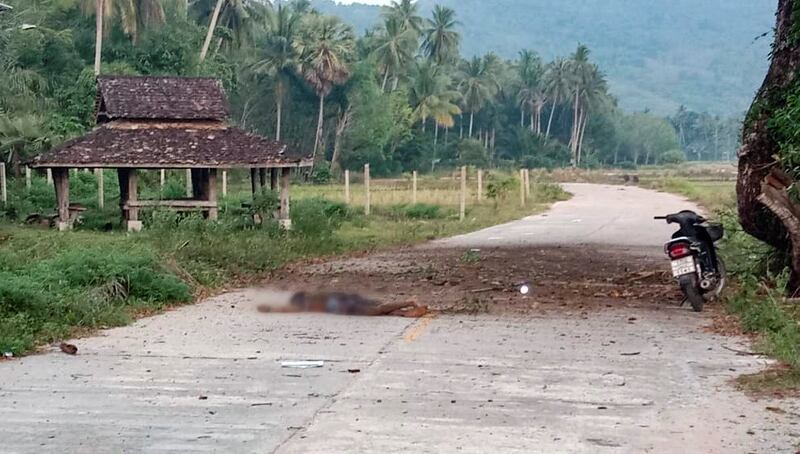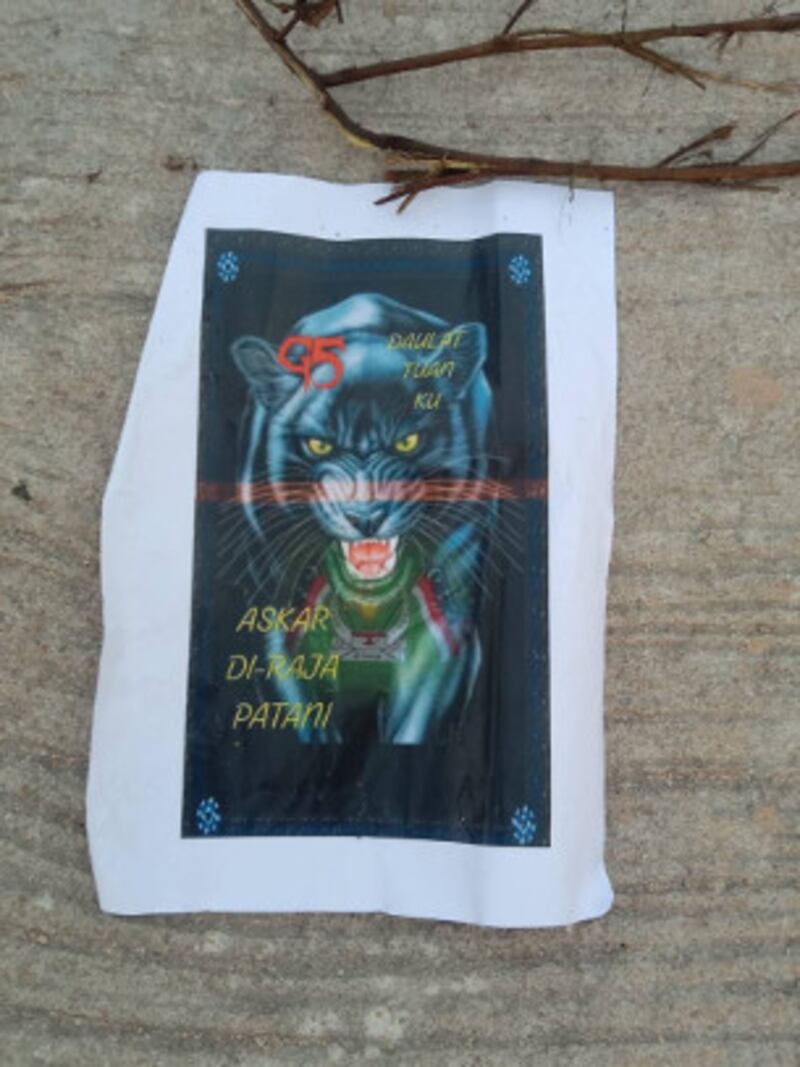The leader of the PULO separatist group claimed Friday it carried out a deadly twin bombing in Thailand’s Deep South because it was sidelined from peace talks between Thai negotiators and another rebel group, BRN, and wanted to be included.
The explosions on Friday struck Sai Buri, a district of Pattani province, in the middle of Ramadan, killing a villager and injuring three members of a police bomb squad, officials said.
"Today's incidents were carried out by one of our five PULO operation units. It is to say that the Thai peace dialogue panel must negotiate with all groups. Patani doesn't belong only to the BRN," Kasturi Mahkota, the leader of the Patani United Liberation Organization, told BenarNews.
The attack shattered a relative calm that had settled over Thailand's southern border region since early April. It was the first bloodshed since Barisan Revolusi Nasional rebels and the Thai government, through direct talks brokered by Malaysia, agreed to a 40-day pause in violence during the Islamic fasting month.
Patani is the name given to the Deep South by armed groups, like BRN and PULO, which have been waging a decades-long separatist insurgency in the mainly Muslim and Malay-speaking region.
“We have five units across the region, but I cannot tell you which one conducted the attacks today,” said Kasturi, head of one of three factions, called PULO-MKP (Majlis Kepimpinan Pertubuhan, or Party Leadership Council).
Friday’s attack marked “the first in recent years,” Kasturi told BenarNews via text messages. The last known PULO attack took place in 2016.
Before Thailand opened direct talks with BRN in January 2020, two factions of PULO as well as BRN and two other rebel groups were represented on MARA Patani, a panel that negotiated with the Thai side. Kasturi was one of the PULO representatives on the panel. Those talks, which began in 2015, were also facilitated by Malaysia but they fizzled out after the BRN started talking directly with Bangkok.
On Friday, a BRN source told BenarNews via a text message that they were not responsible for the twin bombings in Sai Buri, but declined to comment further.

In the first blast, Navi Pramon, a resident of Lahan, a village in Sai Buri, was killed when a bomb hidden in a paper bag on the roadside went off around 3 a.m., police said.
“His friend walked to the field as Navi parked his motorbike near a tree and found a paper bag. He picked it up, and the bomb exploded, killing him there,” said Col. Chalermchai Petchkart, Sai Buri’s police chief.
Later, two other bombs were found nearby. Police bomb-squad personnel defused one but another exploded, injuring three of them. They injuries were serious but not life threatening, police said.
At the bomb site, police found a flyer with the image of a tiger (pictured below) and a message in the Malay language, saying: DAULAT TUANKU; G5 ASKAR DI-RAJA PATANI, which translates to “Long Live the King”; “G5 Patani Royal Army,” according to Thai authorities.
It refers to when the region was the Kingdom of Patani Darussalam, a Muslim sultanate in the northern end of the Malay Peninsula that encompasses what are now the Thai provinces of Pattani, Yala, Narathiwat, and four districts of Songkhla. Thailand annexed it in 1909 as part of a treaty with Britain.

BRN, PULO and peace talks
Both BRN and PULO are considered the oldest secessionist movements in the Deep South.
Established in 1968, PULO was the most influential insurgent group there until the 1990s. But Barisan Revolusi has emerged as the most powerful of the armed insurgent groups in southern Thailand since the insurgency reignited in January 2004, when BRN rebels raided a Thai army ammunitions depot.
They are believed to be responsible for most attacks that have killed more than 7,000 people in the past 18 years, according to Deep South Watch, a local think-tank.
During the latest round of Thai-BRN talks facilitated by Malaysia near Kuala Lumpur on March 31-April 1, the two side agreed to cease violence as part of a so-called Ramadan Peace Initiative to build confidence and trust. For the first time, unarmed rebels were allowed to visit their families during the Muslim holy month. Some were released from custody, while Thai authorities agreed not to arrest BRN members or conduct raids.
A senior Thai official involved in the peace talks said Friday’s attack in Pattani would not hamper the peace efforts.
“First, we have to talk and try to verify who conducted these attacks,” Lt. Gen. Thira Daehwa, the secretary of Thailand’s Peace Dialogue Panel, told BenarNews.
“It appears that PULO is the culprit with a reasoning that it disagreed with the talks that may successfully bring about peace in the region – just because it has not participated in the process,” he said.
“These attacks disrupt but would not affect the peace process. All the sides are determined and patient to make peace happen.”
However, according to an expert on the Deep South, Friday’s attack showed that the current peace process is weak.
“It is risky when this kind of incident takes place. It’s evident that the talks must include multiple parties,” Prof. Srisompob Jitpiromsri, the director of Deep South Watch, told BenarNews.
“However, it is important to have an efficient investigation process of incidents to make things clear with patience.”
Meanwhile in Pattani, one resident said that rebels from all groups must consider the villagers’ safety.
“Whatever you do, just don’t target the villagers. It’s not good,” said Abdullah Eso, a local businessman, told BenarNews.
“It doesn’t matter whether they are Buddhist or Muslim, you have no excuse to attack them. One died; what did that villager do to you?”
Muzliza Mustafa contributed to this report from Kuala Lumpur.
